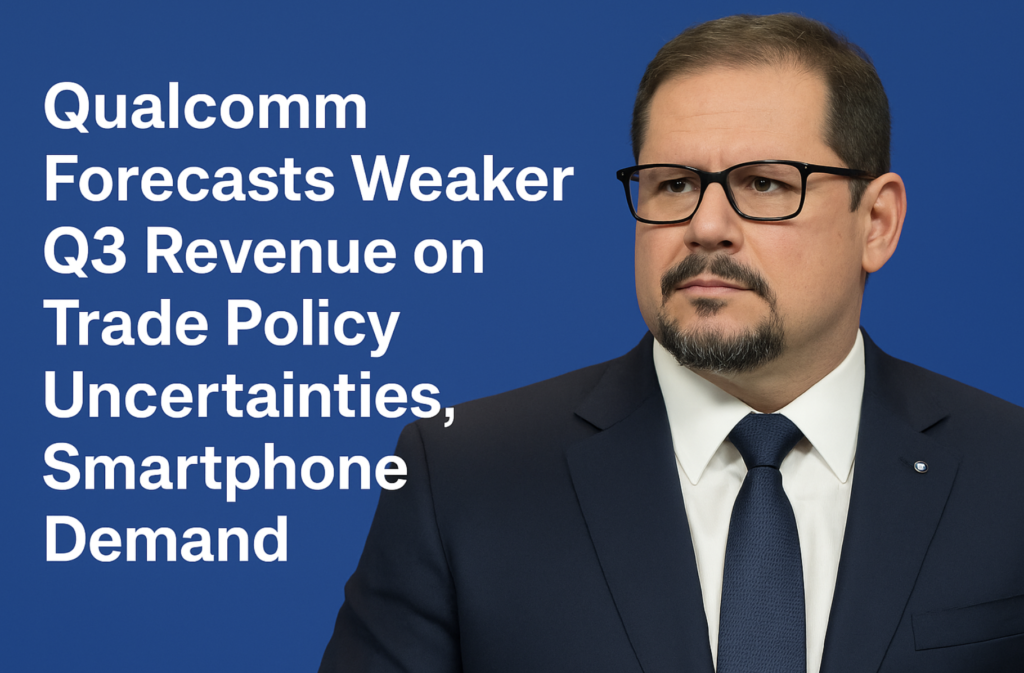Qualcomm global mobile chip leader has released a third-quarter (Q3) revenue forecast that is disappointing Wall Street investors. This is based on US President Donald Trump’s trade policies and the weak demand for smartphone chips, says Qualcomm.
What did Qualcomm say?
Qualcomm: In its Q3 guidance, the company said it will generate revenue of $10.3 billion, slightly below Wall Street analysts’ estimate of $10.35 billion. At the same time, adjusted earnings per share (EPS) would be between $2.60 and $2.80.
The company also reported that the current global economic situation and unpredictability of trade policies, specifically the current trade tension between the US and China, are affecting its business.
Better-than-expected performance in Q2
It must be noted that the company recorded second quarter (Q2) revenues of $10.98 billion and adjusted earnings per share of $2.85, which beat analyst expectations. Although this performance was wonderful, Qualcomm’s shares fell 6% in after-hours trading after the disappointing third-quarter outlook release.
Impact of President Trump’s trade policies
Qualcomm informed the Wall Street Journal that President Donald Trump’s foreign trade policies and increased tensions between the US and China have made their chip supplies and global demand change. Recently, the Trump administration placed sanctions on several Chinese technology firms, leading to the uncertainty in trade between the US and China.
They believe that unless and until these policies change soon, international companies like Qualcomm will have to rethink their supply chain as well as their global strategy.
Increased rivalry from Apple
The other major challenge for Qualcomm is coming from Apple. Apple, the largest customer firm of Qualcomm, has been designing its own in-house modem chips. It is estimated that by 2027 Apple can completely stop depending on Qualcomm.
This can be a big revenue loss for Qualcomm, as the chip supply for Apple products has been one of its largest sources.
CEO Cristiano Amon‘s reaction
Qualcomm CEO Cristiano Amon in the statement mentioned, “Our priority is innovation and operational efficiency in a risky world. Our objective is technological leadership and long-term strategies.”
He further stated that the company is accelerating investment in AI, automotive and 5G segments, so that future challenges can be tackled and opportunities can be created in emerging markets.
Condition of global chip industry
The entire chip sector has suffered on many fronts in the past few months. On the one hand, there is a downturn in the smartphone market, on the other hand, there is volatility in Chinese, Indian and other emerging economies’ demand. Apart from this, the supply chain of many corporations has been disrupted with the imposition of export controls by the US.
As IDC analyst Neil Shah states, “Qualcomm’s problem isn’t the company‘s alone, but the whole industry is at a transition phase. Technological changes, company policies and customer demand – the three are occurring simultaneously.”
Future strategy of Qualcomm
Although the issues are huge, Qualcomm has already mentioned that it will not be counting solely on the smartphone industry. Qualcomm is diversifying presently into car chips, industrial IoT, AI processors and wireless networking solutions.
Qualcomm has recently partnered with various car manufacturers where it uses its Snapdragon Digital Chassis technology. This can create new sources of revenues for the firm, which can reduce dependence on clients like Apple.
Investor concerns and analysts’ opinion
While Qualcomm’s Q2 report has been strong, investors fear that this trend may not continue in the next several quarters. In a Morgan Stanley analyst‘s opinion, “Amid reduced dependence on Apple and uncertainty in the Chinese market, the company will have to make quick strategic changes.”
Alternatively, some analysts hold the view that Qualcomm’s diversification plan has the potential to make it more formidable in the long term. If the firm can excel in markets like automotive and AI, it can continue to be a technology leader in the coming decade.
What does the market say?
Qualcomm shares fell 6% in late trading, demonstrating that investor attitudes have been shaken. While the decline will most likely be transient, it illustrates that the market is still afraid of Trump’s trade policies and Apple’s strategy.
Conclusion
Qualcomm presently is confronted by twin challenges—international trade instability on the one side and weak demand in the mobile phone space on the other. How successful the moves by CEO Cristiano Amon and company diversification measures will translate in the near term will be revealed in the coming months.
